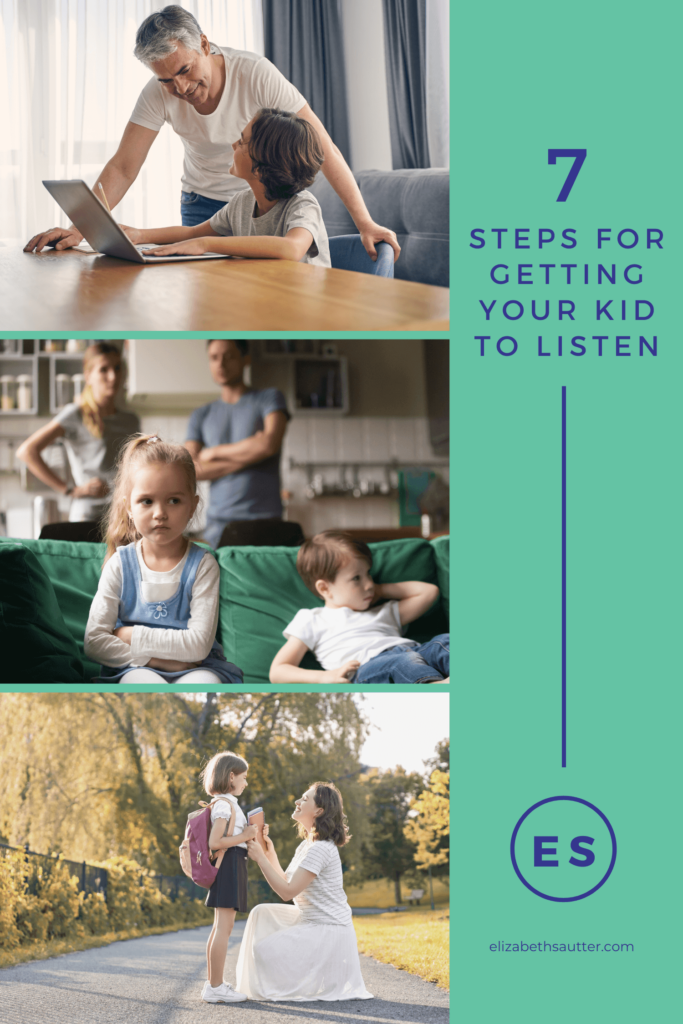As a parent, how many times have you caught yourself complaining– “My kid doesn’t listen to me!” You may feel as if you are asking them to do the same things over and over. “It’s time to come to dinner…Hurry up, it’s time for school! Have you done your chores, homework, cleaned your room?” And on and on.
You know they don’t have ear wax build up. Are they just being stubborn? Are they ignoring you on purpose? Why aren’t they paying attention? Frankly, it can make you feel crazy!
What if it is none of those things? Let’s dive into this and see what’s really going on here.
First, let’s make a few things very, very clear…
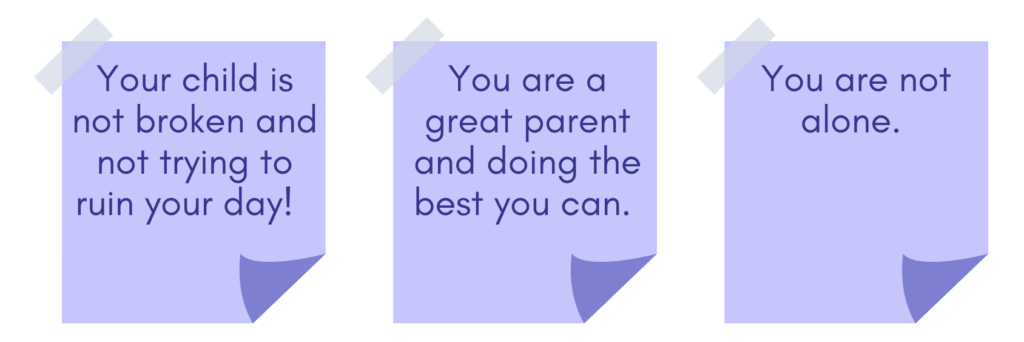
Listening is complex!
“Listening” isn’t just about hearing what was said. It’s much more complicated, especially for neurodivergent kids with additional needs.
The listening process (as defined by author Joseph DeVito, 2000) has five stages: receiving, understanding, remembering, evaluating, and responding. See more on this here.
If we really think about these complex skills, when we ask our children to listen, we are actually talking about regulation and executive functioning. We are asking them to do something with the information they are hearing and processing. And when we ask them to do something that is a non-preferred task or demand, things become even more complicated and challenging.
What is regulation?
Regulation is critical for many skills in life and develops with age, just like walking and talking. Regulation is about identifying and managing your level of alertness, and energy, and adjusting your feelings/emotions to meet the demands or tasks around you. It involves being able to process information and have something called situational awareness, where you are aware of what is going on around you. It also involves perspective-taking and being able to think about the people involved. It’s also part of what we call executive functioning.
What is executive functioning?
Executive functioning is our ability to think about and manage our actions. This includes planning, organizing, problem-solving, working memory (holding information in your mind to do something with it), and task initiation–anything that takes conscious effort or action.
Let’s examine an example:
Sam is playing chess online in his room when you ask him to come out and set the table for dinner. When you make your request, you are asking him to do many things: to stop what he is doing (and enjoy doing), to think about what you asked, to hold that information in his brain, to change his focus to a new thing, to regulate his frustration about transitioning from a non-preferred to a preferred activity and to initiate a whole new set of steps,
Let’s flip the table for a second. What if you were sitting in your cozy chair, deep into a new novel at an exciting part? Suddenly, your child asks you to help them find their soccer shirt in the laundry and wash it for the game later. You would need to stop your reading, remember and process what they just said, figure out where those clothes might be, get up and start the task, all the while trying to stay calm and regulated after giving up your one minute of peace for the afternoon.
These are all regulation and executive functioning tasks!
How Do Regulation and Executive Functioning Relate to Listening?
When listening involves doing something with the information provided, it requires both regulation and executive functioning.
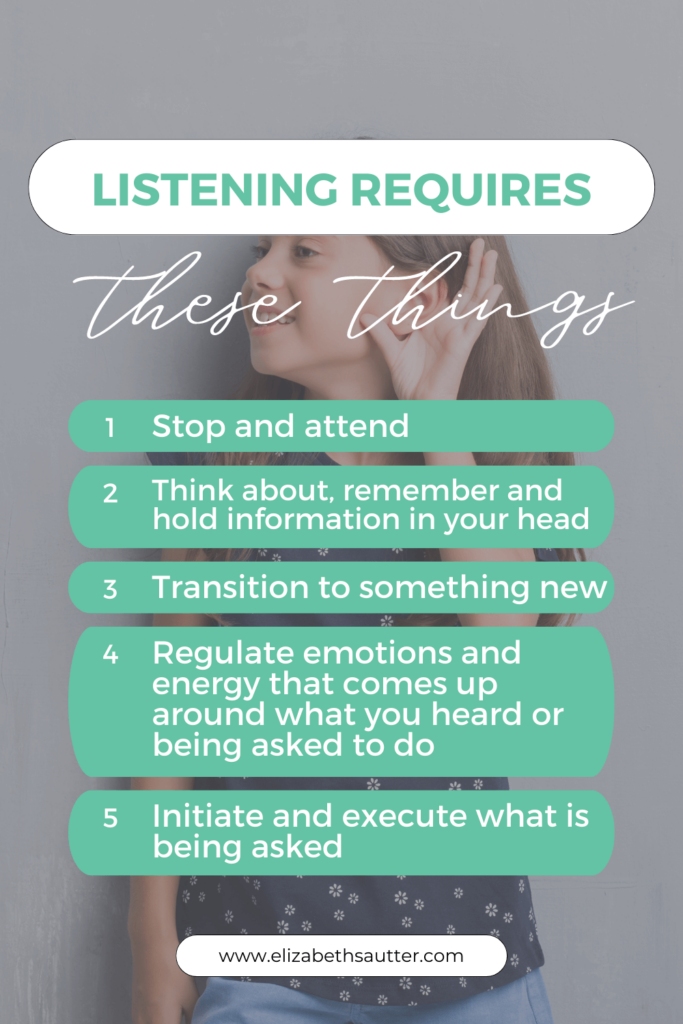
This is really complex. No wonder kids (and people in general) often push back or fail at “listening.”
The BIG Mindset Shift:
Even if kids don’t seem to be listening to us, they aren’t willfully ignoring us. They may be struggling to regulate and/or execute and carry out what you are asking them to do. Instead of assuming they are NOT LISTENING or seeing their behavior as being non-compliant, disrespectful, unappreciative, __________ (fill in the blank), let’s step into their shoes and try to see what they are really struggling with when it comes to these extremely complex skills.
Maybe it appears that they are NOT LISTENING because…
- They can’t process two things at once.
- They are engrossed in another activity.
- They are struggling to transition from a preferred to non-preferred task or activity.
- They heard you ask them something but couldn’t hold the information in their brain to remember and follow through.
- They are thinking about something else.
The human brain does not fully develop until age 25 or later. Since regulation and executive functioning are developmental skills, we cannot expect them to do all of this flawlessly and with ease.
If we change our mindset about these frustrating listening exchanges, it can help our own level of regulation and allow us to lean in with compassion and curiosity.
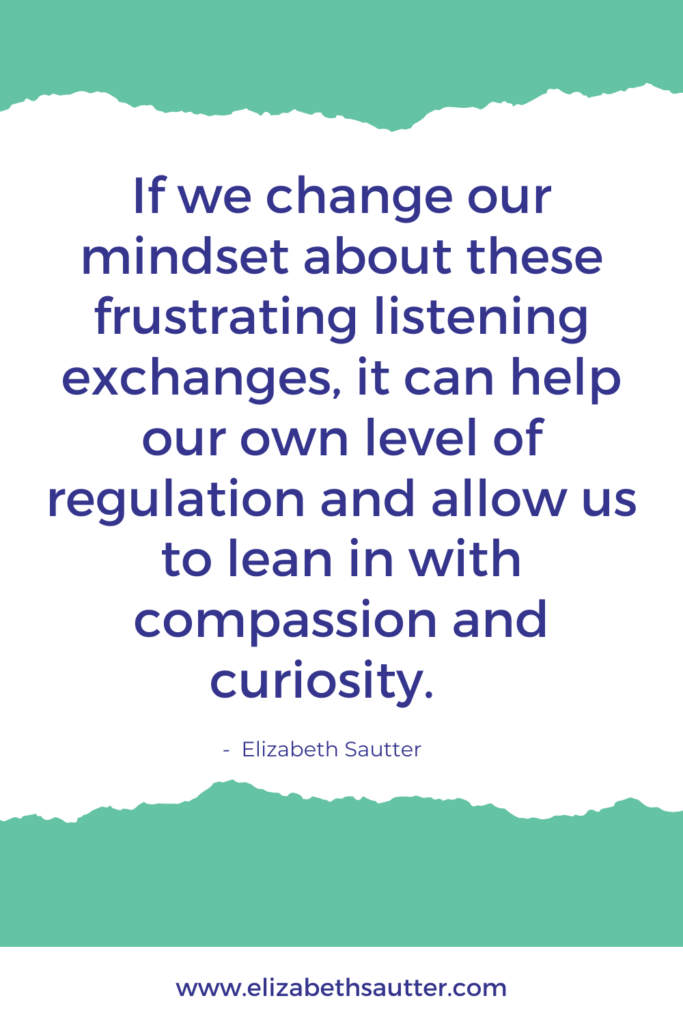
Now that we have this mindset clear, NOW WHAT?
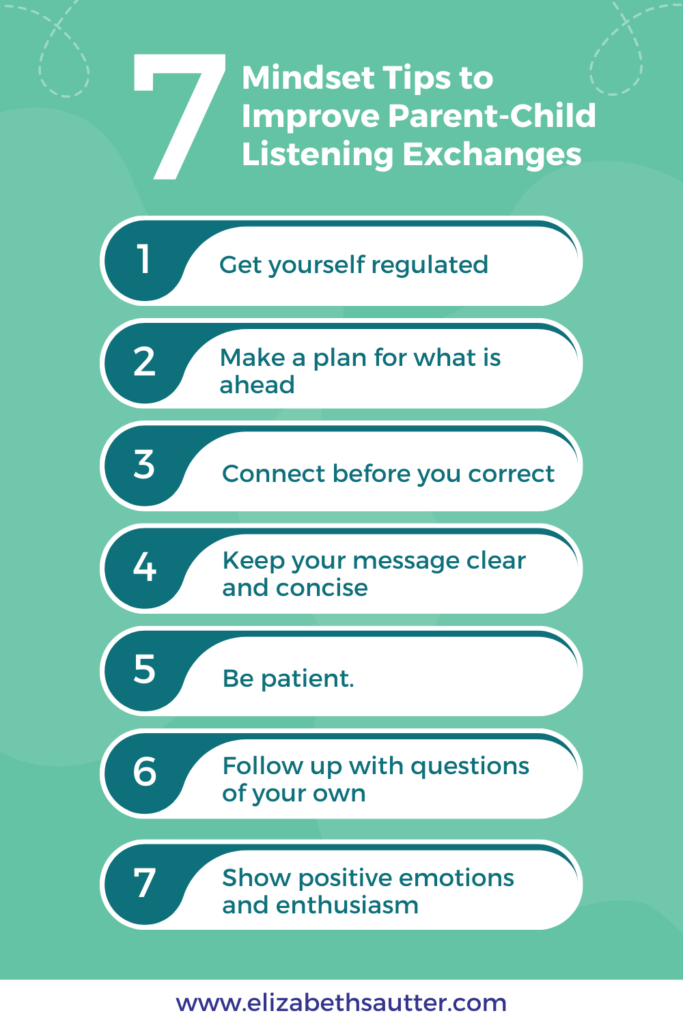
Get yourself regulated. Take a deep breath or two–one for you and one for your child. Feel your feet on the ground. Pause before you respond!
Make a plan for what is ahead. Collaborate with your child on which strategies will work for them in order to complete the task. Do they need advanced notice of 5-15 min? A timer? Do they need you to provide support? What’s a good stopping and following through plan?
Connect before you correct. This idea comes from the book called ‘The Whole Brain Child’ by Dr. Daniel Siegel and Dr. Tina Payne Bryson. “Logic often won’t work until we have responded to the right brain’s emotional needs. We call this emotional connection ‘attunement,’ which is how we connect deeply with another person and allow them to ‘feel felt.’” (pp. 24)
Keep your message clear and concise. Avoid giving long-winded explanations or yelling instructions from another room. Be specific and stick to the point and use simple language that they will understand.
Be patient. Allow your child time to process what you’re saying and respond accordingly. If they seem confused, rephrase your question or statement in a different way. Or, have them repeat back what was said to them.
Follow up with questions of your own. Ask them if they have any questions about what you just discussed or if they need clarification on anything. This shows that you value their input and want to make sure they fully understand the conversation.
Show positive emotions and enthusiasm. Thank them when they do listen and follow directions and tell them how helpful it is. Let them know that you appreciate their cooperation.
It’s important to remember that it takes time for children to learn these skills. The brain and body have to do A LOT in order to process and apply information to action. Be patient and consistent with your approach, but don’t be afraid to try different strategies if something isn’t working. All brains are different and listening looks different for each person. With the right tools and a little bit of patience, you can help your child boost these essential life skills while also building your relationship with your child and keeping peace at home!
If you’re looking for practical strategies to improve communication and listening skills with your child, check out the “Listening Strategies Poster” by Elizabeth Sautter. This poster offers helpful insights and visual cues to support regulation, executive functioning, and effective listening.
 Join the Upcoming Workshop –
Join the Upcoming Workshop – 
